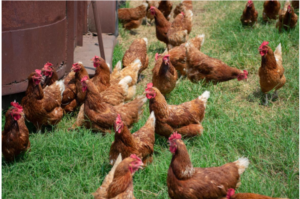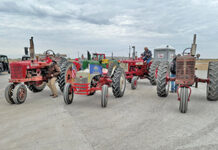As reported in FarmTalk. If you find yourself driving down the dirt roads of Pawnee, Oklahoma, or shopping at the farmer’s market in Oklahoma City, you just might run into Chad Ward of Ward Family Farm.
“I’m the third generation of Ward here on the farm,” Ward said. “My grandparents, who did sharecrop and custom hay, bought the farm in the ‘70s.”
Working alongside his father and brother, Ward has focused his efforts on growing the farm’s animal operation.
“We all kind of run separate businesses,” Ward said. “When I came home from college I added the pastured poultry. I raise meat chickens and hens, and I’ve started finishing beef. We’re finishing lamb and starting this fall we’ll have our own pork.”
Ward considers their production practices a hybrid of conventional methods and organic methods.
“For example, our chickens are our primary products,” Ward said. “They’re fed all non-medicated feed and they’re in chicken tractors where we can move them every day so they’re always on fresh grass.”
These more specialized production methods carry over into the processing procedure. Ward takes his chickens to be processed with methods he believes in, like refraining from using chlorine baths.
“We want to create an absolute premium product, but by doing things that are actually going to affect flavor and quality,” Ward said. “Sometimes I think going organic for the sake of being organic means sourcing something more expensive and it’s not going to improve flavor.”
This dedication to a premium product has allowed a change to the farm’s marketing approach.
“Farming is what we’ve always done,” Ward said. “I grew up in the cab of the tractor. What’s new is the direct marketing.”
The direct marketing approach sets the Ward family apart from other farms in the area. They’ve implemented a home delivery service with three separate routes in their community, and they attend farmer’s markets in places like Oklahoma City.
“My dad and my brother would be completely content to be on a tractor 18 hours a day and never see another soul,” Ward said. “Don’t get me wrong, I enjoy my tractor days, but I need people. Direct marketing gives me that interaction with people.”
Selling directly to his consumers also allows Ward to set his own price. With an educational background in economics, not relying on the market was a welcome change, and also allows Ward to focus on other, more important, goals.
“I care deeply about our small, rural communities that have been devastated over the last 50 years by extractive economic practices,” Ward said. “We put all our resources from all out rural communities to support our cities. That includes the people. Growing up in school it was always the best and the brightest go off somewhere and get an education and stay there. We’ve robbed ourselves of the brain trust we need to make these communities work.”
This passion has led Ward to making a dedicated effort to provide opportunities for people in his community, in ways as simple as sourcing high-quality chicken feed from the local mill rather than non-GMO feed from big companies miles away.
“That’s why I make deliveries in Tulsa and do the farmer’s markets in Oklahoma City,” Ward said. “I need to take the capital that has left us and bring it back.”
The direct marketing Ward does isn’t without its challenges. For one, their distance from the market can cause logistical juggling.
“There’s plenty of people doing similar things to what I’m doing,” Ward said. “But they’re raising pasture poultry within two hours of like 30 million people. I have to drive two hours to get to a metro of 1 million. So, figuring out those logistics and how to make that make sense has definitely been the biggest challenge.”
Ward is also competing with the cheaper food sources that are available to people living in rural communities.
“We’re maybe a little bit ahead of the curve,” Ward said. “This kind of food is really popular on the coasts, but its not as cheap as Walmart which is what’s really popular here.”
Ward has worked to educate his customers on why his products are more expensive than what’s available on the local grocery shelves.
“I hate to say it, but the pandemic was phenomenal for my business,” Ward said. “People saw empty grocery store shelves and realize food didn’t grow in the back, so they went looking for the places it did.”
Like many, Ward is now trying to understand what the “new normal” looks like for him and his business.
“It’s not even that I’m down in sales all that much,” Ward said. “It’s just way inconsistent now. We’re learning to navigate the rollercoaster.”
The Ward family has used this time to plan for the coming years.
“This year has been a big refocusing,” Ward said. “This is the first year we pulled way back on growing the produce and focused a lot heavier towards our animals. So, we’re going to lean into that more.”
When it comes to setting goals, Ward doesn’t have a specific sales number in mind, or a certain number of animals he wants to process. Instead, he continues to focus on the community.
“Within the next two to five years, I really, really want to be able to bring someone else on full-time,” Ward said. “I want room in the business to provide a full-time job in the community for one thing. And it would provide a little breathing room for me.”





